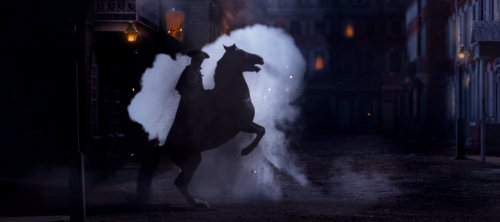An “A” for Effort, by Josh Long
1 Apr
Traditionally, the American Christian right is closely associated with conservatism and traditional “American” values. So it’s no surprise that Burns Family Studios, a Christian film company started by two home-schooling families, chooses to set their new film around the American Revolution. The company has one film under their belt so far, the medieval epic Pendragon: Sword of His Father, which was well received at several Christian and Family Film festivals. While Pendragon was a passion project shot in back yards and starring the Burns family themselves, Beyond the Mask is a more ambitious, higher budget project, aiming to stand alongside similar Hollywood projects.
Beyond the Mask is the story of William Reynolds, an assassin for the greedy East India Company. When Reynolds tries to break ties with the EIC (run by the conniving Charles Kemp, as played by John-Rhys Davies), they try to have him killed. To escape their clutches, he poses as a vicar. While in disguise, he falls for the young Charlotte Holloway, only to find that she is the niece of Charles Kemp. When Kemp finds him alive, Reynolds is forced to flee to America. While there, he uncovers plans by the EIC to disrupt the upcoming Continental Congress. He again goes into hiding, foiling their plans under cover of night as alter-ego “The Highwayman.” When Charlotte arrives in America with her uncle, Reynolds must win back favor with her, and gain her help to fight against her uncle’s evil plots.
The historical epic isn’t something you’ll run across often in the world of Christian film. It’s primarily a budget issue – Christian film is at this point a kind of subset of independent film, and will rarely drum up the budgets necessary for something to compare to The Patriot (let alone something like Exodus: Gods and Kings). So a film like Beyond the Mask raises questions from the outset. Is this too big a movie to work on an independent budget?
I think it’s first of all important to state the positives. This film is ambitious. Some would argue that it’s aiming higher than it can realistically achieve, but I think we should recognize the merit in trying. Christian film is still small-scale as a movement, and plagued with the same problems as most ultra-low budget indies. In trying to make something bigger, films like this one can help to push the movement forwards. It can be an agent for change, even if it isn’t a complete success. I haven’t seen Pendragon, but Beyond the Mask definitely seems like a step forwards to me. They’re hiring real, accomplished actors instead of using family members. They’re incorporating practical, often difficult, stunts and effects. Much of the technical side is strong, and Christian films need to be doing this if they want to be taken seriously. In all of these ways, this film is good for Christian cinema.
Of course, good by Christian standards does not mean good by cinema standards. Beyond the Mask fails to seem comparable to studio films of similar scale and story. General audiences and critics alike expect a certain standard from their films, and this one falls short in many ways. On the script level, the story structure is weak, going in too many directions. There’s enough plot development for three different movies in here, and it would have been stronger if they were able to stick to one, focused story arc. The character of William has a good arc, and clear motivations, but many of the other characters only ever serve as benefits or obstacles for him. Even with Charlotte there’s no real relationship or growth. In terms of the special effects, the CGI is very obvious most of the time – probably comparable to your average Asylum film (Sharknado, anyone?). It’s not laughable, but it’s not great, and the more false the world looks, the less believable we find the characters.
The core message of the film is strong – Reynolds wants a “new name,” or redemption from his shadowy past as an assassin. Throughout the film he finds ways to redeem himself by doing good. Still, this isn’t enough, and in order for him to feel fully redeemed, there is a rather clunky scene where he accepts Christ’s forgiveness, as administered by an otherwise inconsequential vicar on a prison ship. The moment is important to round out the film’s message, but unfortunately feels forced, especially since the conversion moment is simply described in the following scene (the opposite of the old adage “show, don’t tell”). I’ll admit I was hoping for the redemption to come through metaphor, rather than an actual conversion moment, which has become the “money shot” of Christian movies. But since there is a strong message behind it, the film may be effective for Christian audiences. Certainly family friendly, it may be a good one for young children and Christian families. But it’s probably going to leave fans of historical epics disappointed.
I don’t mean to belittle a small film because it isn’t Citizen Kane. There are plenty of terrible studio films that come out every year. On the contrary, I want to encourage Christian films to meet the standards of the movie-going world. If it’s not good enough for these people, it’s losing a chance to present an effective message. Maybe this is Burns Family Studios showing what they can do with a little, and hoping they can parlay it into a chance to show what they can do with a lot. If so, more power to them, and I hope they’re successful. If nothing else, I applaud their effort to make Christian films that appeal to mainstream audiences.


3 Responses to “An “A” for Effort, by Josh Long”